Of all food categories, it may be safe to say that ensuring the purity of baby foods and making sure there are no toxic ingredients or metal in it should be a priority. However, a national investigation showed that toxic metals were found in 95 percent of tested baby foods.
The fact that heavy metals in baby food exist was uncovered nearly a decade ago, but we assumed measures were taken to resolve this danger. It’s true that efforts made by the U.S. Food and Drug Administration (FDA), along with baby food companies and nonprofit organizations, have reduced metal in baby food products.


